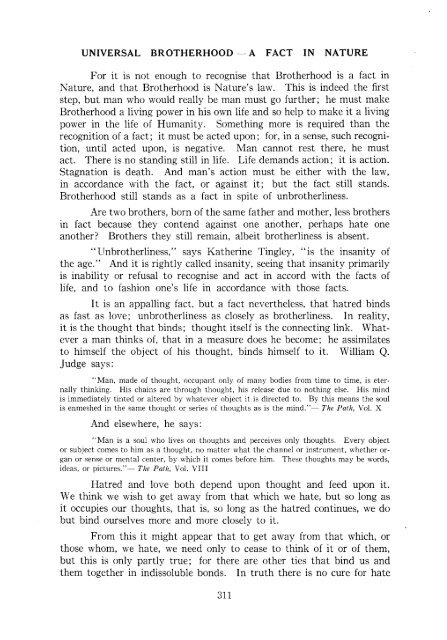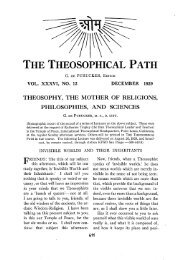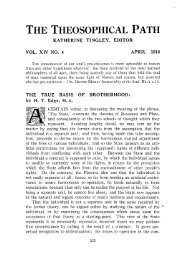vol. xxx, no. 4 april 1926 universal brotherhood - a fact in nature
vol. xxx, no. 4 april 1926 universal brotherhood - a fact in nature
vol. xxx, no. 4 april 1926 universal brotherhood - a fact in nature
Create successful ePaper yourself
Turn your PDF publications into a flip-book with our unique Google optimized e-Paper software.
UNIVERSAL BROTHERHOOD - A FACT IN NATURE<br />
For it is <strong>no</strong>t e<strong>no</strong>ugh to recognise that Brotherhood is a <strong>fact</strong> <strong>in</strong><br />
Nature, and that Brotherhood is Nature's law. This is <strong>in</strong>deed the first<br />
step, but man who would really be man must go further; he must make<br />
Brotherhood a liv<strong>in</strong>g power <strong>in</strong> his own life and so help to make it a liv<strong>in</strong>g<br />
power <strong>in</strong> the life of Humanity. Someth<strong>in</strong>g more is required than the<br />
recognition of a <strong>fact</strong>; it must be acted upon; for, <strong>in</strong> a sense, such recogni-<br />
tion, until acted upon, is negative. Man can<strong>no</strong>t rest there, he must<br />
act. There is <strong>no</strong> stand<strong>in</strong>g still <strong>in</strong> life. Life demands action; it is action.<br />
Stagnation is death. And man's action must be either with the law,<br />
<strong>in</strong> accordance with the <strong>fact</strong>, or aga<strong>in</strong>st it; but the <strong>fact</strong> still stands.<br />
Brotherhood still stands as a <strong>fact</strong> <strong>in</strong> spite of unbrotherl<strong>in</strong>ess.<br />
Are two brothers, born of the same father and mother, less brothers<br />
<strong>in</strong> <strong>fact</strong> because they contend aga<strong>in</strong>st one a<strong>no</strong>ther, perhaps hate one<br />
a<strong>no</strong>ther? Brothers they still rema<strong>in</strong>, albeit brotherl<strong>in</strong>ess is absent.<br />
" Unbrotherl<strong>in</strong>ess," says Kather<strong>in</strong>e T<strong>in</strong>gley, "is the <strong>in</strong>sanity of<br />
the age." And it is rightly called <strong>in</strong>sanity, see<strong>in</strong>g that <strong>in</strong>sanity primarily<br />
is <strong>in</strong>ability or refusal to recognise and act <strong>in</strong> accord with the <strong>fact</strong>s of<br />
life, and to fashion one's life <strong>in</strong> accordance with those <strong>fact</strong>s.<br />
It is an appall<strong>in</strong>g <strong>fact</strong>, but a <strong>fact</strong> nevertheless, that hatred b<strong>in</strong>ds<br />
as fast as love; unbrotherli~less as closely as brotherl<strong>in</strong>ess. In reality,<br />
it is the thought that b<strong>in</strong>ds; thought itself is the connect<strong>in</strong>g l<strong>in</strong>k. What-<br />
ever a man th<strong>in</strong>ks of, that <strong>in</strong> a measure does he become; he assimilates<br />
to himself the object of his thought, b<strong>in</strong>ds himself to it. William Q.<br />
Judge says:<br />
"Man, made of thought, occupant only of many bodies from time to time, is eter-<br />
nally th<strong>in</strong>k<strong>in</strong>g. His cha<strong>in</strong>s are through thought, his release due to <strong>no</strong>th<strong>in</strong>g else. His m<strong>in</strong>d<br />
is immediately t<strong>in</strong>ted or altered by whatever object it is directed to. By this means the soul<br />
is enmeshed <strong>in</strong> the same thought or series of thoughts as is the m<strong>in</strong>d." The Path, Vol. X<br />
And elsewhere, he says:<br />
"Man is a soul who lives on thoughts and perceives only thoughts. Every object<br />
or subject comes to him as a thought, <strong>no</strong> matter what the channel or <strong>in</strong>strument, whether or-<br />
gan or sense or mental center, by which it comes before him. These thoughts may be words,<br />
ideas, or pictures."- The Path, Vol. VIII<br />
Hatred and love both depend upon thought and feed upon it.<br />
\Ye th<strong>in</strong>k we wish to get away from that which we hate, but so long as<br />
it occupies our thoughts, that is, so long as the hatred cont<strong>in</strong>ues, we do<br />
but b<strong>in</strong>d ourselves more and more closely to it.<br />
From this it might appear that to get away from that which, or<br />
those whom, we hate, we need only to cease to th<strong>in</strong>k of it or of them,<br />
but this is only partly true; for there are other ties that b<strong>in</strong>d us and<br />
them together <strong>in</strong> <strong>in</strong>dissoluble bonds. In truth there is <strong>no</strong> cure for hate













